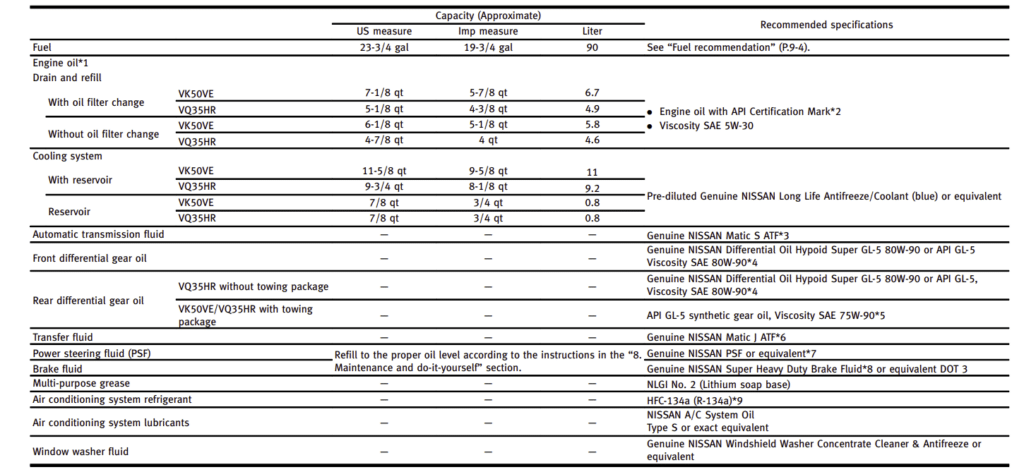The Infiniti FX50 is a luxury crossover SUV that’s well-regarded for its sporty performance and stylish design. Released in 2009, the FX50 combined the utility of an SUV with the performance of a sports car. The FX50 is powered by a potent 5.0-liter V8 engine coupled with a seven-speed automatic transmission that delivers a seamless driving experience.
Transmission fluid plays a pivotal role in keeping your Infiniti FX50 performing at its peak. It serves multiple critical functions, such as lubricating the transmission’s moving parts, cooling the transmission by dissipating heat, and acting as a hydraulic fluid that enables gear shifts.
Having the correct type and amount of transmission fluid can significantly extend the life of your transmission, prevent costly repairs, and ensure a smooth and comfortable ride. On the contrary, ignoring your transmission fluid needs can lead to rough shifting, transmission overheating, and in the worst cases, complete transmission failure.

Therefore, understanding your FX50’s transmission fluid type, capacity, and change intervals is key to preserving your vehicle’s performance and longevity.
Infiniti FX50 Transmission Fluid Capacity And Transmission Fluid Type
The Infiniti FX50, being a standout model in its class, went through only a single generation during its production run from 2009 to 2013.
The first generation FX50 utilized a sophisticated 7-speed automatic transmission. This transmission was designed to optimize the power output from the FX50’s potent 5.0L V8 engine, providing crisp and smooth gear changes. In terms of driving dynamics, the combination of the powerful engine and efficient transmission made the FX50 a unique offering in the luxury SUV market.
Notably, the FX50’s transmission featured both manual shift mode and downshift rev matching, giving drivers an enhanced level of control over the vehicle’s performance. The manual shift mode allowed for manual gear selection, offering a more engaging driving experience, while the downshift rev-matching feature ensured smoother gear changes when downshifting.
For the Infiniti FX50’s 7-speed automatic transmission, the transmission fluid capacity is approximately 11.9 quarts (11.2 liters) when completely drained, including the fluid stored in the transmission fluid cooler lines.
However, it’s crucial to note that during typical transmission fluid change services, not all the fluid in the system gets replaced, as a significant amount can remain in the torque converter and cooler lines. Therefore, a standard fluid change might require only about 5 to 6 quarts.
When replacing or adding fluid, always ensure the vehicle is level and check the fluid level with the engine running at idle, the transmission in park, and the fluid at operating temperature. Overfilling or underfilling can both have detrimental effects on the transmission’s operation and lifespan. Always refer to your vehicle’s owner’s manual for the most accurate information.
Infiniti recommends using Nissan Matic S automatic transmission fluid in the FX50’s 7-speed automatic transmission. This fluid is specifically designed to work optimally with Nissan and Infiniti transmissions, providing the necessary lubrication, temperature stability, and friction characteristics required for smooth operation.
- The exact Original Equipment Manufacturer fluid that your vehicle came with; use where Nissan Matic-S fluids are required in Nissan, Infiniti, and other make vehicles
- Matic-S ATF supersedes Matic-J ATF
- For “Rear Wheel Drive” 5-speed automatic transmissions (that is 350Z, Armada, Titan, G35, FX35, FX45, M45, Q45)
- Not for Nissan 3 or 4-speed automatic, front wheel drive 5-speed automatic or CVT transmissions
While the manufacturer’s recommended fluid is typically the safest choice, there are several compatible alternatives available. Always remember, when selecting a transmission fluid, it is essential to ensure it is fully compatible with your specific transmission.

Infiniti FX50 Transmission Fluid Change Intervals
For the Infiniti FX50, Infiniti recommends changing the transmission fluid every 60,000 miles under normal driving conditions. However, for severe operating conditions, such as frequent stop-and-go driving, driving in dusty conditions, towing, or off-road use, Infiniti recommends a more frequent change interval.
Factors Affecting Change Intervals
Several factors can affect the optimal transmission fluid change interval:
- Driving Conditions: As mentioned, severe operating conditions can lead to increased transmission fluid degradation and necessitate more frequent changes.
- Type of Transmission Fluid: Some high-quality synthetic transmission fluids may offer improved resistance to thermal breakdown and longer service life compared to conventional fluids.
- Vehicle Usage: Vehicles that are used for towing, hauling, or other heavy-duty applications can experience increased transmission temperatures, leading to faster fluid degradation.
- Transmission Health: If the transmission is experiencing issues, such as slipping, rough shifts, or overheating, a fluid change may be required sooner than the recommended interval.
Always monitor the condition of your transmission fluid and pay attention to any changes in transmission performance. When in doubt, consult with a qualified automotive technician to determine the optimal fluid change interval for your specific situation.
Infiniti FX50 Transmission Fluid Change Cost
The cost to change the transmission fluid in an Infiniti FX50 can vary based on the location, the mechanic’s rates, and the type of fluid used. However, on average, you might expect to pay between $230 to $280 for a transmission fluid change. This price typically includes labor and the cost of the fluid itself.
Several factors can influence the cost of a transmission fluid change:
- Labor Rates: The cost of labor can vary significantly based on the region and the specific shop or dealership. Dealerships may charge higher rates than independent shops, but they also typically offer OEM parts and specialized knowledge of your specific vehicle.
- Fluid Cost: The cost of the transmission fluid itself can vary based on the type and brand. High-quality synthetic fluids are usually more expensive than conventional fluids.
- Additional Services: In some cases, a transmission fluid change may be performed as part of a larger service, such as a transmission flush or a general vehicle service. These additional services can add to the cost.
Remember, while cost is an important factor, it should not be the only consideration. Regular transmission maintenance, including fluid changes, is essential to prolonging the life of your transmission and avoiding costly repairs or replacements down the line.
Last update on 2026-01-30 / Affiliate links / Images from Amazon Product Advertising API
















